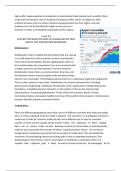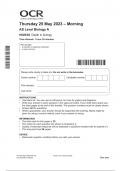Essay
*NEW* Unit 5 International Business: P3 - Explain the main features of globalisation that affect two contrasting businesses.
- Institution
- PEARSON (PEARSON)
*Certified High Graded Work* Unit 5 International Business: P3 - Explain the main features of globalisation that affect two contrasting businesses. Learning aim B: Investigate the international economic environment in which business operates B1 Globalisation • The main features of globalisati...
[Show more]




